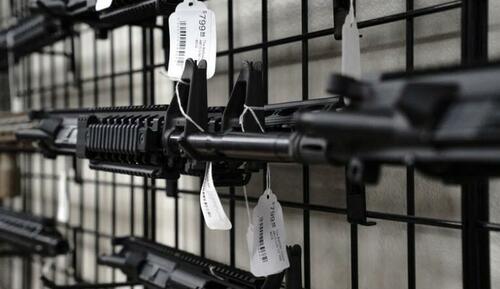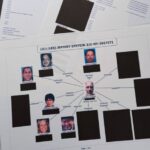
We recently discussed a federal judge enjoining the new Illinois law banning “assault weapons.”
Now a gun shop in Naperville, Illinois has made it to the Supreme Court in seeking injunctive relief and Justice Amy Coney Barrett has given the proponents of the law until Monday to respond to the request.
On Tuesday afternoon, Barrett issued the order to the city of Naperville in Illinois after Robert Bevis, owner of Law Weapons & Supply, challenged two bans.
First, he is challenging the Protect Illinois Communities Act (PICA) that was the subject of the earlier injunction.
“This is an exceedingly simple case.
The Second Amendment protects arms that are commonly possessed by law-abiding citizens for lawful purposes, especially self-defense in the home,” the plaintiffs wrote in their emergency application.
“The arms banned by Respondents are possessed by millions of law-abiding citizens for lawful purposes, including self-defense in the home.”
The petitioners went on to argue that the recently passed local and state laws violate the 2008 and 2022 precedents.
“Under this Court’s precedents, ‘that is all that is needed for citizens to have a right under the Second Amendment to keep such weapons'” the plaintiffs continued. “There cannot be the slightest question, therefore, that the challenged laws are unconstitutional.”
“The challenged laws are unconstitutional because ‘[w]hen the Second Amendment’s plain text covers an individual’s conduct, the Constitution presumptively protects that conduct.’ Plaintiffs desire to keep and bear for lawful purposes (including defense of their homes) the semi-automatic firearms and firearm magazines banned by the challenged laws,” they wrote.
Second, he is challenging a separate Naperville city ban that he says is destroying his business.
“Mr. Bevis has extended his personal credit, missed personal payments like home and car payments, maxed his credit limits, and taken out loans to pay the monthly bills,” the plaintiffs wrote, adding that his company will be unable to abide by the terms of its 15-year commercial lease for its business property or pay equipment leases and purchase inventory “if these bans remain in effect any longer.”
Here is the key question in Bevis v. Naperville and the State of Illinois, No. 22A948:
Can the government ban the sale, purchase, and possession of certain semi-automatic firearms and firearm magazines tens of millions of which are possessed by law-abiding American for lawful purposes when there is no analogous historical ban as required in D.C. v. Heller (2008)…and New York State Rifle & Pistol Association v. Bruen (2022).
When Barrett was up for confirmation, I noted that the Second Amendment could prove one of her most interesting legacy areas of jurisprudence. Her dissent in Kanter v. Barr as an appellate judge was a powerful defense of Second Amendment rights. Rickey Kanter was convicted of one count of felony mail fraud for defrauding Medicare in connection with therapeutic shoe inserts. Focusing on the “history and tradition” of such restrictions, Barrett also took on the voting rights and jury service point with a key distinction:
“The problem with this argument is that virtue exclusions are associated with civic rights—individual rights that “require[ ] citizens to act in a collective manner for distinctly public purposes.” See Saul Cornell, A New Paradigm for the Second Amendment , 22 LAW & HIST. REV. 161, 165 (2004). For example, the right to vote is held by individuals, but they do not exercise it solely for their own sake; rather, they cast votes as part of the collective enterprise of self-governance. Similarly, individuals do not serve on juries for their own sake, but as part of the collective enterprise of administering justice…
Heller , however, expressly rejects the argument that the Second Amendment protects a purely civic right. Moore v. Madigan , 702 F.3d 933, 935 (7th Cir. 2012). It squarely holds that “the Second Amendment confer[s] an individual right to keep and bear arms,” Heller , 554 U.S. at 595, 128 S.Ct. 2783 (emphasis added), and it emphasizes that the Second Amendment is rooted in the individual’s right to defend himself—not in his right to serve in a well-regulated militia, id. at 582–86, 128 S.Ct. 2783.”
In this case, we are dealing with a direct ban on certain weapons that are loosely characterized as “assault weapons.”
I have previously raised doubts over some of these laws, which are based on questionable factual claims and distinctions between weapons. Indeed, President Biden has made dubious constitutional and historical claims about the Second Amendment and AR-15s.
Illinois and New York have previously supplied gun rights advocates with huge victories by drafting facially unconstitutional laws. Moderate efforts at gun control are often ramped up in the legislative process to become more and more sweeping.
This is a standard response to such an emergency filing. Yet, these cases are now bubbling up to the Court from various states and it seems increasingly likely that the Court may be inching toward a new review of Second Amendment claims. However, the Court often prefers to wait for a conflict in the circuits to allow lower courts to be heard on such laws.
We recently discussed a federal judge enjoining the new Illinois law banning “assault weapons.”
Now a gun shop in Naperville, Illinois has made it to the Supreme Court in seeking injunctive relief and Justice Amy Coney Barrett has given the proponents of the law until Monday to respond to the request.
On Tuesday afternoon, Barrett issued the order to the city of Naperville in Illinois after Robert Bevis, owner of Law Weapons & Supply, challenged two bans.
First, he is challenging the Protect Illinois Communities Act (PICA) that was the subject of the earlier injunction.
“This is an exceedingly simple case.
The Second Amendment protects arms that are commonly possessed by law-abiding citizens for lawful purposes, especially self-defense in the home,” the plaintiffs wrote in their emergency application.
“The arms banned by Respondents are possessed by millions of law-abiding citizens for lawful purposes, including self-defense in the home.”
The petitioners went on to argue that the recently passed local and state laws violate the 2008 and 2022 precedents.
“Under this Court’s precedents, ‘that is all that is needed for citizens to have a right under the Second Amendment to keep such weapons’” the plaintiffs continued. “There cannot be the slightest question, therefore, that the challenged laws are unconstitutional.”
“The challenged laws are unconstitutional because ‘[w]hen the Second Amendment’s plain text covers an individual’s conduct, the Constitution presumptively protects that conduct.’ Plaintiffs desire to keep and bear for lawful purposes (including defense of their homes) the semi-automatic firearms and firearm magazines banned by the challenged laws,” they wrote.
Second, he is challenging a separate Naperville city ban that he says is destroying his business.
“Mr. Bevis has extended his personal credit, missed personal payments like home and car payments, maxed his credit limits, and taken out loans to pay the monthly bills,” the plaintiffs wrote, adding that his company will be unable to abide by the terms of its 15-year commercial lease for its business property or pay equipment leases and purchase inventory “if these bans remain in effect any longer.”
Here is the key question in Bevis v. Naperville and the State of Illinois, No. 22A948:
Can the government ban the sale, purchase, and possession of certain semi-automatic firearms and firearm magazines tens of millions of which are possessed by law-abiding American for lawful purposes when there is no analogous historical ban as required in D.C. v. Heller (2008)…and New York State Rifle & Pistol Association v. Bruen (2022).
When Barrett was up for confirmation, I noted that the Second Amendment could prove one of her most interesting legacy areas of jurisprudence. Her dissent in Kanter v. Barr as an appellate judge was a powerful defense of Second Amendment rights. Rickey Kanter was convicted of one count of felony mail fraud for defrauding Medicare in connection with therapeutic shoe inserts. Focusing on the “history and tradition” of such restrictions, Barrett also took on the voting rights and jury service point with a key distinction:
“The problem with this argument is that virtue exclusions are associated with civic rights—individual rights that “require[ ] citizens to act in a collective manner for distinctly public purposes.” See Saul Cornell, A New Paradigm for the Second Amendment , 22 LAW & HIST. REV. 161, 165 (2004). For example, the right to vote is held by individuals, but they do not exercise it solely for their own sake; rather, they cast votes as part of the collective enterprise of self-governance. Similarly, individuals do not serve on juries for their own sake, but as part of the collective enterprise of administering justice…
Heller , however, expressly rejects the argument that the Second Amendment protects a purely civic right. Moore v. Madigan , 702 F.3d 933, 935 (7th Cir. 2012). It squarely holds that “the Second Amendment confer[s] an individual right to keep and bear arms,” Heller , 554 U.S. at 595, 128 S.Ct. 2783 (emphasis added), and it emphasizes that the Second Amendment is rooted in the individual’s right to defend himself—not in his right to serve in a well-regulated militia, id. at 582–86, 128 S.Ct. 2783.”
In this case, we are dealing with a direct ban on certain weapons that are loosely characterized as “assault weapons.”
I have previously raised doubts over some of these laws, which are based on questionable factual claims and distinctions between weapons. Indeed, President Biden has made dubious constitutional and historical claims about the Second Amendment and AR-15s.
Illinois and New York have previously supplied gun rights advocates with huge victories by drafting facially unconstitutional laws. Moderate efforts at gun control are often ramped up in the legislative process to become more and more sweeping.
This is a standard response to such an emergency filing. Yet, these cases are now bubbling up to the Court from various states and it seems increasingly likely that the Court may be inching toward a new review of Second Amendment claims. However, the Court often prefers to wait for a conflict in the circuits to allow lower courts to be heard on such laws.
Loading…






